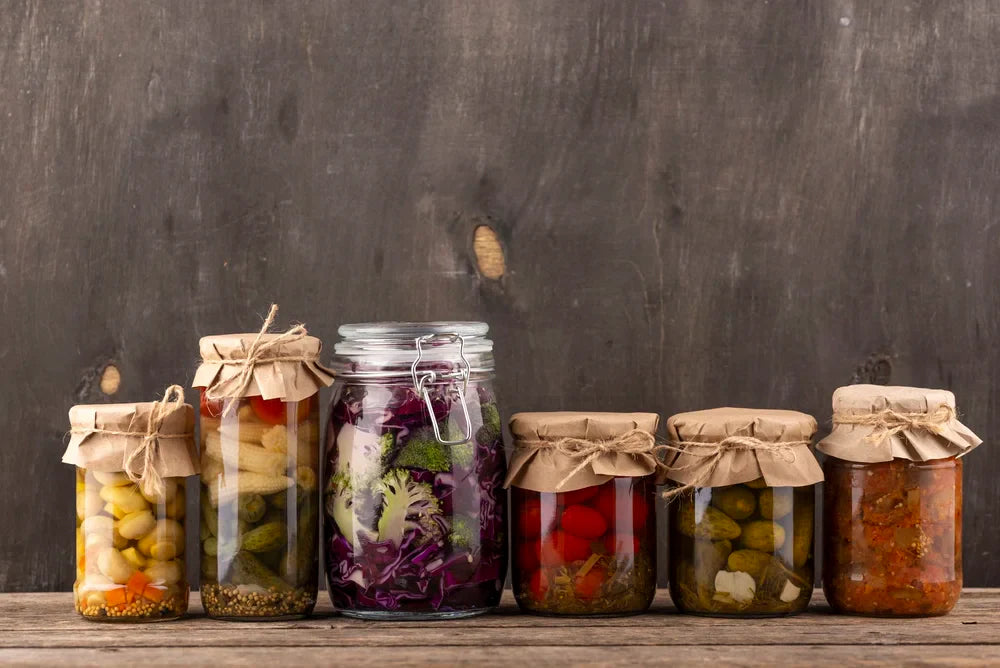Fermentation has long been called a kind of alchemy—a living, bubbling process that transforms simple plants into something richer, more complex, and profoundly nourishing. Across cultures and centuries, people have turned to fermented tonics not only to preserve herbs and foods, but also to support digestion, boost vitality, and even uplift the spirit. Today, as science continues to uncover the intimate connection between the gut and the brain, fermented herbal tonics are finding a fresh place in modern wellness.
A Tradition of Living Brews
Ancient people didn’t think of probiotics, microbiota, or serotonin—they simply knew that fermented drinks made them feel good. In Eastern Europe, kvass was brewed from rye bread and herbs; in Asia, kombucha was prized for its effervescent lift; in South America, chicha was prepared from grains and plants. Herbs added flavour, preservation, and healing qualities, transforming these beverages into everyday tonics.
This rich tradition reminds us that fermentation is both practical and sacred—an act of patience, transformation, and trust in nature’s invisible helpers.
Gut Health and the Mood Connection
Modern science now explains why these ancient brews were so valued. Fermentation produces probiotics—beneficial bacteria that help maintain a healthy balance in the gut. Since nearly 70% of the immune system lives in the digestive tract, this balance impacts not just digestion, but energy, mood, and resilience.
Even more fascinating is the gut-brain axis: the constant two-way communication between our intestines and our nervous system. The gut produces neurotransmitters like serotonin (the “feel good” chemical), meaning that nurturing gut health can directly influence mood and emotional wellbeing. Emerging research even points to “psychobiotics” (probiotics with potential mood-regulating effects).
Herbs That Shine in Fermentation
Not all herbs ferment well, but many do—and they bring their own healing qualities to the brew:
-
Ginger – Warming, stimulating, and supportive for digestion.
-
Lemon Balm – A calming nervine herb that eases stress and lifts mood.
-
Holy Basil (Tulsi) – An adaptogen that balances stress and supports resilience.
-
Chamomile – Gentle, soothing, and helpful for rest and relaxation.
When fermented, some herbal compounds become easier for the body to absorb, deepening their benefits.
A Simple Fermented Herbal Tonic at Home
You don’t need a full apothecary to start experimenting. Here’s a simple framework:
-
Choose your herbs – fresh or dried (ginger and lemon balm are a wonderful pair).
-
Make a sweetened infusion – brew the herbs as a tea, then add a touch of honey or sugar to feed the fermentation.
-
Add a starter culture – like whey, kombucha SCOBY, or water kefir grains.
-
Ferment in a glass jar – cover with cloth and let it sit at room temperature for 2–3 days, tasting daily.
-
Strain, bottle, and chill – enjoy your living herbal tonic over ice.
Fermentation as a Ritual
Beyond the health benefits, fermentation invites us to slow down. It asks us to wait, to observe, and to let go of control—mirroring the way our bodies and minds also need time and balance to transform. Sipping a fermented herbal tonic can become a daily ritual: a small moment of nourishment for both body and spirit.
Fermented herbal tonics are more than trendy drinks. They are bridges between old traditions and new science, between the gut and the mind, between patience and reward. Whether you’re seeking better digestion, calmer moods, or simply a deeper connection with your food, these alchemical brews offer a path worth exploring.

